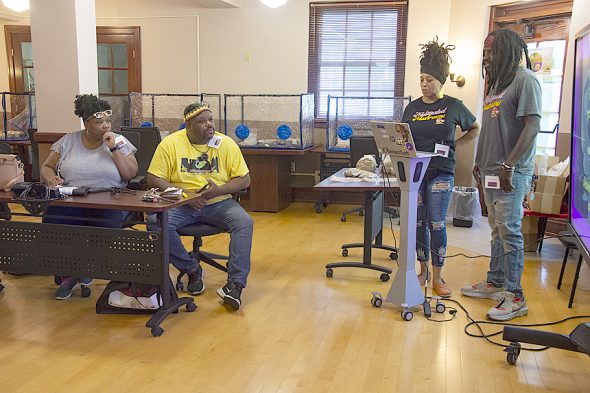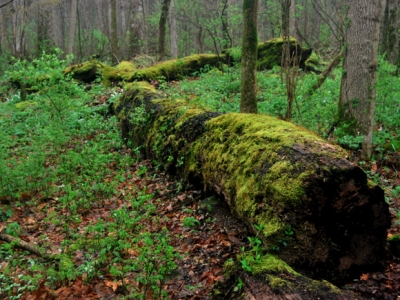
The annual Black Farming Conference returns Sept. 27 and 28, this year hosted in Columbus. At right are Cheryl and Vernon Clements, of Melanated Mushrooms, pictured leading a mushroom cultivation skillshare at last year’s conference. At center left is Damon Bazziel, of AGrowCulture, who will lead a hydroponics workshop at this year’s conference. The Clementses also return to this year’s event. (Submitted photo)
Annual Black Farming Conference to return
- Published: September 26, 2024
The annual Black Farming Conference returns this year on Friday and Saturday, Sept. 27 and 28 — this time in a new location.
The conference, organized and hosted by the BIPOC Food and Farming Network, or BFFN, has been held in Wilberforce at the National Afro-American Museum and Cultural Center and the neighboring campus of Central State University for the past two years. It now moves to the historic King Lincoln Bronzeville District in Columbus, for a weekend of events to include a networking mixer, a farm fair, workshops and skillshares and an awards gala.
The News spoke last week with BFFN Executive Director Patty Allen, who said the move to Columbus for this year’s event is tied to the network’s growing influence throughout the state of Ohio and surrounding region.
“The BIPOC Food and Farming Network is a statewide organization, and we wanted to reflect that and be present where our members are,” Allen said.
She added, however, that the conference will not be disconnected from Wilberforce and its Miami Valley roots.
“We are planning to bring it back to Central State — we’re working on a [memorandum of understanding] with Central State to bring the conference there every other year,” she said.
The first iteration of what would become the Black Farming Conference, 2020’s “Black Farming: Beyond ‘40 Acres and a Mule,’” was hosted by the Agraria Center for Regenerative Practice. The event was also a kind of genesis for the BFFN, which formed when folks who took part in the first event found they wanted to stay connected. Allen was hired to manage the network based on her background as a founding member of the Northeast Farmers of Color Network, or NEFOC, which formed in 2018.
“I had been a part of the Northeast Network and watched it scale up quickly — in 2018 there were 40 of us on a Google group, and by 2022 there were over 500 members,” Allen said. “I was brought in [to the BFFN] to replicate that model of support here in Ohio. … That was my charge and my mission.”
Originally under the umbrella of Agraria, the BFFN is now a distinct entity: In May this year, the organization received its own 501(c)(3) nonprofit status, and now operates with its own advisory board and executive committee. Allen noted, however, that though the BFFN is independent from Agraria, it contnues to be headquartered on the grounds of Agraria and that the two organizations still cross paths on projects.
“Agraria really did incubate the network and is still an important partner for [the BFFN],” she said.
As the News reported last month, a grant from the YS Community Foundation enabled the BFFN to enlist CPA Jeffrey Steed, of Unitary Accounting, to assist the newly minted nonprofit in preparing its 2024 and 2025 tax returns and train BFFN administrators in bookkeeping and accounting processes.
“I want to ensure, even though we do have a treasurer and a CFO on our board, that we’re very responsible and that I’m educated and trained,” Allen said. “So I’m very grateful that [Steed] is on our team and will make sure that we do everything correctly.”
The network has also undergone a slight name change, having previously been known as the BIPOC Farming Network. Allen said the organization changed its name to the BIPOC Food and Farming Network last year.
“We realized we had a lot of members who aren’t necessarily farmers, but they work in food systems, so we wanted to reflect that,” she said.
The BFFN’s growth from grassroots group to statewide organization over the last several years is mirrored by the expansion of the Black Farming Conference — not only in terms of its change in location, but in its approach. Though the first few conferences were largely held online, in part due to the COVID-19 pandemic, more recent events have worked to incorporate hands-on educational opportunities for those who attend.
This year’s conference will include education around seed-saving and sharing from local resident Florentina Rodriguez, founder of the YS Community Seed Library, as well as a workshop on hydroponic vegetable growing — that is, growing vegetables not in soil, but in a water-based nutrient solution — presented by Damon Bazziel, founder and CEO of AGrowCulture.
“Participants will take home hydroponic kits,” Allen said. “So they’ll bring home their knowledge, but also projects to work on.”
Another hands-on skillshare will be hosted by Cheryl and Vernon Clements, founders of Akron-based Melanated Mushrooms, who spoke with the News this week. The couple, whose business encompasses not only cultivating mushrooms, but also art and education — they regularly host workshops and teach art and entrepreneurship to youth at the Rainey Institute — said they initially began their foray into the world of fungi two years ago as an inroad into exploring the health benefits of mushrooms.
“It emerged from a personal journey of transitioning from processed vegan meats to whole-plant-based foods,” Cheryl Clements said.
“I was diagnosed with high blood pressure, and Cheryl’s mother passed from cancer,” Vernon Clements added. “We started looking into ways to change our lifestyle so we could eat healthier, and now we want to teach the same things.”
The Clementses said they were “hooked” on growing mushrooms from the start: Mushrooms, they said, are especially good for sustainable growth because mycelium — the fungal filaments that produce mushrooms — can feed on a wide variety of substrates, from toilet tissue to straw to banana leaves to hardwood fuel pellets.
And with the right knowledge and care, mushrooms are easy to grow, they added. As Melanated Mushrooms, the Clementses prepare and nurture mushroom blocks that are sold to customers who want to grow their own food, making the process even easier for first-time cultivators.
“It’s fascinating to see them growing almost before your eyes,” Vernon Clements said. “You can leave [the mushroom block] there the whole day, and when you come back, it’s grown. That’s one of the things we say: ‘Mushrooms are going to grow, with or without you.’”
The Clementses bring to this year’s conference the same hands-on skillshare they originated at last year’s event, teaching attendees to mix mycelium and substrate within a sterile environment to cultivate mushrooms. They noted that the BFFN purchased sterile cultivation tents for Melanated Mushrooms to use at last year’s event — and beyond.
“They purchased our supplies and gave us an honorarium, which gave us the opportunity to continue mushroom cultivation workshops in the future,” Cheryl Clements said, noting that the couple’s participation in last year’s Black Farming Conference put Melanated Mushrooms on the radar of the Ohio Ecological Food and Farm Association, or OEFFA. The Clementses were later asked to present a talk on mushroom cultivation for an OEFFA conference event.
Patty Allen said the Black Farming Conference aims to provide similar support for all its presenters and workshop leaders as they work to bolster food systems throughout the state.
“My hope for all of the presenters, and for [BFFN] members, is that they get something out of it that helps them in their growing operations and food system work,” she said.
She added that the BFFN holds a similar goal in educating its attendees.
“This conference is part of the food sovereignty movement, and I think the pandemic taught us all that access to your local grocery store can easily be curtailed,” Allen said. “What we hope to teach people is that you don’t have to be a farmer to produce your own food.”
For more information on the 2024 Black Farming Conference, including a full schedule of events and locations, and to register, go to http://www.bit.ly/BlackFarmingConference2024. All events are free, but seating is limited and registration is required.
The Yellow Springs News encourages respectful discussion of this article.
You must login to post a comment.
Don't have a login? Register for a free YSNews.com account.













No comments yet for this article.